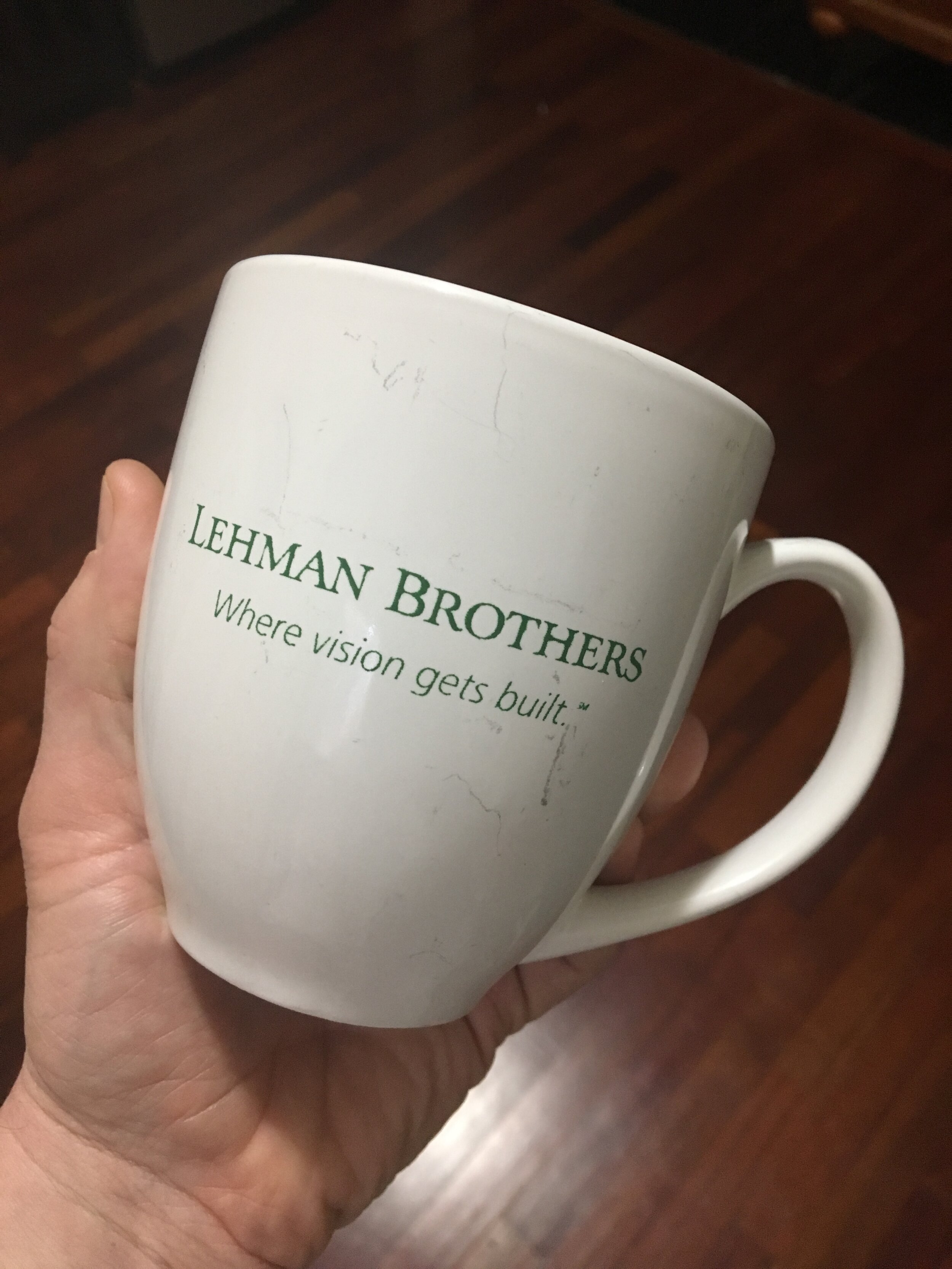Why I love this Lehman Brothers mug
“Lehman Brothers. Where vision gets built.”
As a paleontologist, studying the past, extinct dinosaurs and ammonites, natural disasters like asteroid impacts, eruptions and ice ages, this mug appeals to a certain fascination I have- a fascination with death, disaster, and ruin. For me, it’s like an artifact from a doomed civilization, like sipping coffee from a relic of Atlantis. It’s like holding a hand axe once wielded by an extinct species of hominid, and wondering what happened to the people that made it.
If you don’t remember, Lehman Brothers was a New York City investment bank. Founded in 1847, it was the fourth-largest investment bank in the US. In 2008, following massive losses in subprime mortgages, Lehman Brothers became unable to access funds, and went bankrupt overnight, ending a run of more than 150 years. Its failure made people afraid to loan money, which helped kick off the 2008 financial crisis. My friend in New York worked at Lehman Brothers and lost his job, but kept this mug. When I visit, I drink coffee out of it, and I think it’s sort of funny. Maybe it’s sort of morbid to laugh at this. But he thinks it’s funny too.
The inscription, “Where vision gets built”, is of course, pretty ironic. There wasn’t quite enough vision, the mug implies, to see the impending doom and the collapse of the subprime mortgage markets.
It suggests that Wall Street was guilty of what the Greeks called hubris, arrogance and pride leading to overreach. The Greek historian Herodotus tells about how hubris led the rich and powerful King Croesus of Lydia to attack the Persian Empire, against the advice of the Oracle of Delphi. That mistake resulted in the destruction of Lydia and his defeat and enslavement by Cyrus the Great. Cyrus himself overreached and was killed in battle by the empress Tomyris, somewhere near Kazakhstan. Herodotus describes how, over and over, kings and empires would get cocky, overreach, and destroy themselves in the process. Alexander the Great must have been familiar with this theory of Herodotus’- he was an educated man, taught by the great philosopher Aristotle- but it didn’t prevent him from pushing his empire and himself too far, and destroying both. Today, we see this dynamic play out in corporations- excess of ambition probably destroys as many companies as a lack of ambition. Jim Collins talks about that in his book How the Mighty Fall, about how and why companies fail- undisciplined pursuit of growth is one of the biggest factors in corporate failures. But Herodotus hit on this key insight thousands of years earlier.
I can’t help but think of the famous 1818 poem “Ozymandias”, by Shelley:
I met a traveller from an antique land,
Who said—“Two vast and trunkless legs of stone
Stand in the desert. . . . Near them, on the sand,
Half sunk a shattered visage lies, whose frown,
And wrinkled lip, and sneer of cold command,
Tell that its sculptor well those passions read
Which yet survive, stamped on these lifeless things,
The hand that mocked them, and the heart that fed;
And on the pedestal, these words appear:
My name is Ozymandias, King of Kings;
Look on my Works, ye Mighty, and despair!
Nothing beside remains. Round the decay
Of that colossal Wreck, boundless and bare
The lone and level sands stretch far away.”
“Look upon my Works, ye Mighty, and despair!” Nothing is forever. Kings and CEOs, corporations and empires, wooly mammoths and Brontosaurus, someday the Earth itself. Everything vanishes in time. And we try to create things that will endure against time- “where vision gets built”- but if we push too far, too fast, that only hastens our own destruction.
Sometimes all you can really try to do is enjoy the time we have- savor a good cup of coffee and the company of friends.
